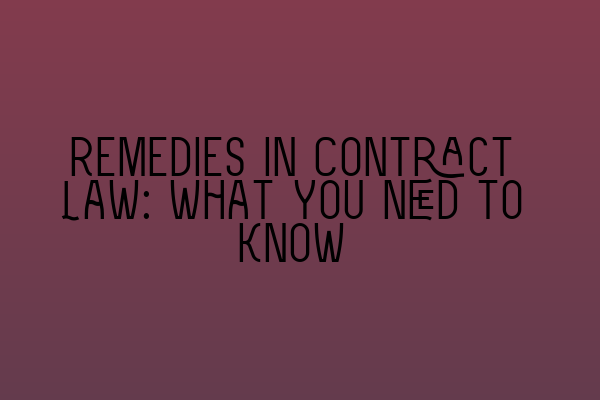Remedies in Contract Law: What You Need to Know
Contracts are an essential part of conducting business and personal transactions. They define the rights and obligations of the parties involved and provide a framework for resolving disputes. However, there are times when one party fails to fulfill their contractual obligations, resulting in a breach of contract. In such cases, the innocent party may seek remedies to recover losses or seek specific performance. In this article, we will delve into the various remedies available in contract law and shed light on what you need to know.
1. Damages
One of the most common remedies for a breach of contract is the awarding of damages. Damages are designed to compensate the innocent party for the losses suffered as a result of the breach. There are two types of damages that can be awarded:
- Compensatory Damages: These aim to put the innocent party in the position they would have been in if the contract had been performed correctly. It covers both direct losses and any reasonably foreseeable losses.
- Consequential Damages: These are awarded for losses that were not directly caused by the breach but were a foreseeable consequence of it. For example, lost profits or reputational damage.
To learn more about damages in contract law, you may refer to our detailed SQE 1 practice exam questions article.
2. Specific Performance
In certain situations, damages may not be an adequate remedy, particularly when the subject matter of the contract is unique or rare. In such cases, the innocent party may seek SQE 2 preparation courses may become beneficial. Specific performance is a remedy that compels the breaching party to fulfill their contractual obligation precisely as agreed. It is commonly used in cases involving real estate, artwork, or bespoke items.
3. Rescission
Rescission allows the innocent party to treat the contract as if it never existed, effectively canceling it and restoring both parties to their pre-contractual positions. This remedy is typically sought when the contract was entered into due to misrepresentation, mistake, duress, or undue influence.
4. Restitution
Restitution is a remedy that aims to restore the innocent party to their pre-contractual position by requiring the breaching party to return any benefits or payments received as a result of the contract. This remedy is often sought in cases involving fraudulent or illegal contracts.
5. Injunction
In certain situations, the innocent party may seek an injunction to prevent the breaching party from continuing to violate the terms of the contract. An injunction is a court order that restrains a party from engaging in certain activities. This remedy is commonly used when monetary damages are not sufficient to remedy the harm caused by the breach.
It is important to note that the availability of these remedies may vary depending on the jurisdiction and the specific circumstances of the case. Consulting with a qualified contract law solicitor is essential to determine the most appropriate remedy for your situation.
For comprehensive preparation resources to excel in your SQE exams, including SQE 1 and SQE 2 practice mocks and FLK1 FLK2 practice mocks, we recommend checking out our SRA SQE exam dates to prepare effectively.
In conclusion, understanding the available remedies in contract law is crucial for anyone involved in commercial or personal transactions. Whether it’s seeking damages, specific performance, rescission, restitution, or injunction, having a clear understanding of these remedies can help protect your rights and interests in the event of a breach of contract.
Note: The information provided in this article is for general informational purposes only and should not be taken as legal advice. To obtain legal advice regarding your specific situation, please consult with a qualified contract law solicitor.
